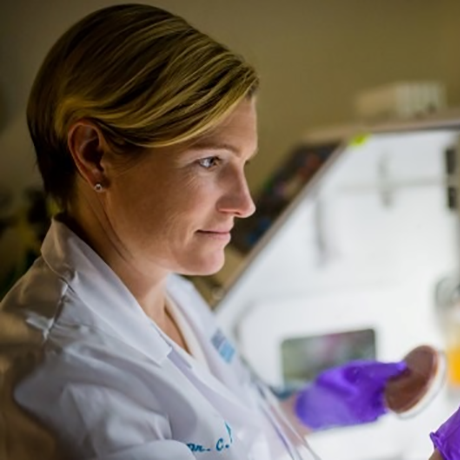Caroline Mitchell, MD, MPH
Caroline Mitchell, MD, MPH
The Vincent Center for Reproductive Biology
About Caroline Mitchell, MD, MPH
Investigator,
Vincent Center for Reproductive Biology, Massachusetts General Hospital
Associate Professor of Obstetrics, Gynecology and Reproductive Biology,
Harvard Medical School
Bacterial cells in and on our bodies outnumber human cells by a 10:1 margin. As we learn more about our bacterial communities, it is clear that these microbes can have a profound influence on our health.
The goal of the Mitchell Lab is to understand how vaginal microbes influence reproductive health and disease. We approach this in two ways: basic science experiments in the lab, and translational studies using patient samples.
Our ongoing studies include:
V —Understanding Vulvovaginal Disorders
There are over 10 million office visits yearly for vaginal complaints – and in over 30% of those cases a diagnosis cannot be made. Even when a diagnosis is made, treatment is often ineffective or benefit is of short duration. We are collecting samples from healthy women and those with vulvovaginal complaints to allow us to identify novel microbes or immune pathways that might be causing symptoms, and to develop better ways to treat symptoms. This work is funded by grants from the NIH and the American Association of Obstetricians and Gynecologists Foundation.
OriGiN – The Origin of Gut microbiota in Neonates
Where do babies get their intestinal bacteria? Is it from their mother? Their environment? Studies have shown that being born vaginally leads to a different gastrointestinal bacterial community than being born via C-section, but we don’t know why. In collaboration with Dr. Moran Yassour from the Broad Institute, we are enrolling pregnant women and to try and better understand how the vaginal microbiota influence the infant gastrointestinal microbiome.
Reproductive Immune Response to Microbes
In our basic science lab work, we are using in vitro models of vaginal tissue to study how individual species of bacteria interact with the vaginal immune response. Inflammation in the reproductive tract has been linked to higher risk of HIV acquisition, preterm birth, miscarriage and infertility. By understanding the pathways involved in these responses, we hope to develop strategies to intervene and improve reproductive health. This work is funded by the Doris Duke Charitable Foundation and the MGH Claflin Award.
MsFlash – Living a Healthy Menopause
Dr. Mitchell is a collaborator in a Seattle-based menopause research network that is studying how the vaginal microbial community and vaginal immune response might influence the vaginal symptoms experienced by over half of menopausal women. This work is funded by the NIH.
Research at Mass General
Every day, our clinicians and scientists chart new terrain in biomedical research to treat and prevent human disease and advance patient care.

